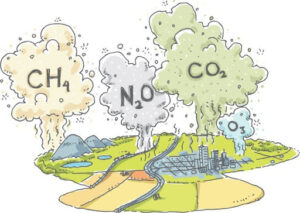What is Climate Change?
Climate change refers to significant shifts in global temperatures and weather patterns over time. While climate change is a natural phenomenon, the recent changes we’re experiencing are happening at an unprecedented rate due to human activities. These activities include burning fossil fuels (like coal, oil, and gas), deforestation, and various industrial processes. The buildup of greenhouse gases in the atmosphere is a primary driver of these rapid changes. Essentially, climate change is the long-term shift in the Earth’s average temperatures and weather conditions.

Over the last decade, the world has been, on average, around 1.2°C warmer than during the late 19th century. It has now been confirmed that global warming exceeded 1.5°C across the 12-month period between February 2023 and January 2024. This followed 2023, which was declared the warmest year on record.
Why Should We Care?
- Extreme Weather Events: Increased frequency and intensity of hurricanes, floods, droughts, and heatwaves.
- Impact on Wildlife: Disruption of ecosystems, leading to endangerment or extinction of species.
- Human Health: Rising temperatures can cause heat-related illnesses, worsen air quality, and increase the spread of diseases.
- Agriculture: Changes in weather patterns can affect crop yields, leading to food shortages.
- Water Supply: Altered precipitation patterns can result in water scarcity or flooding.

Impacts of Climate Change
- Melting Ice Caps: Warmer temperatures cause polar ice caps and glaciers to melt, contributing to rising sea levels and the loss of habitat for polar species.
- Extreme Weather: Increased severity and frequency of weather events like storms, heatwaves, and heavy rainfall.
- Wildlife: Many animals struggle to adapt to changing environments, leading to habitat loss, migration, and extinction.
- Human Health: Increased temperatures can lead to health problems like heatstroke, respiratory issues, and the spread of infectious diseases.
- Agriculture and Water Supply: Changes in precipitation and temperature can negatively impact crop yields and water availability, leading to food and water shortages.